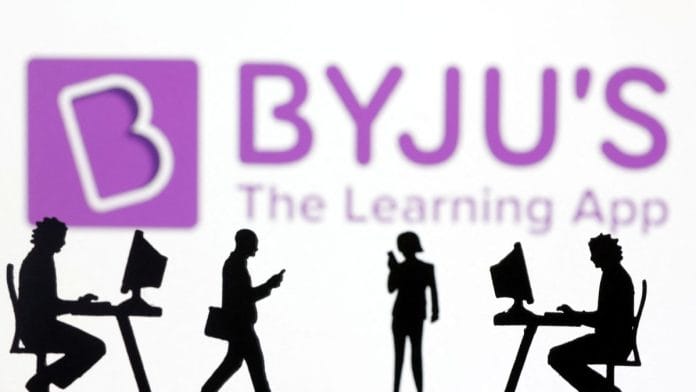New Delhi: The Bengaluru bench of the National Company Law Tribunal (NCLT) Tuesday accepted the Board of Control for Cricket in India’s (BCCI) application to initiate corporate insolvency proceedings against Think & Learn Private Ltd, the parent company of ed-tech firm Byju’s.
The BCCI, responsible for managing professional cricket in the country, filed an insolvency plea against Byju’s citing alleged unpaid dues of Rs 158 crore from a 2019 sponsorship agreement for the Indian cricket team.
The NCLT’s decision comes after Byju’s allegedly failed to pay the dues owed to the BCCI. This marks the initiation of bankruptcy proceedings against one of India’s top ed-tech startups, and a stunning decline from its 2022 valuation of $22 billion.
The BCCI initially filed the plea on 8 September 2023, with the NCLT officially registering it on 15 November.
How will this impact Byju’s
The BCCI filed the plea under section 9 of the Insolvency and Bankruptcy Code (IBC) 2016. As a result, Byju’s is set to experience significant changes in day-to-day functioning, according to the said provision of the IBC.
As per the IBC, control of the company will now be taken from the current management and given to the company’s creditors.
Further, no assets can be transferred during the Corporate Insolvency Resolution Process (CIRP).
Byju’s will be under a moratorium, freezing all debts and interest, until NCLT lifts the moratorium through an order.
The Committee of Creditors (CoC) can manage the company through an Interim Resolution Professional (IRP) or Resolution Professional (RP) for up to 330 days. The resolution professional will be responsible for overseeing the company’s operations and running it as a going concern until the completion of the insolvency process.
The tribunal has designated Pankaj Srivastava as the interim resolution professional, responsible for managing the company until the lenders establish a CoC. If the CoC successfully sells the company through a bidding process within 330 days, Byju’s could be revived by the acquirer.
However, failure to find a buyer within this period will result in liquidation.
Additionally, no legal suits can be instituted or pursued against Byju’s during this time.
What does NCLT order say
In essence, the NCLT order says that, since it was clear there was a debt and a subsequent default of that debt, it saw no reason why insolvency proceedings should not be initiated against Byju’s.
“This Adjudicating Authority is of the considered opinion that there is no reason to deny the petition filed under section 9 of the IBC, 2016 by the Operational Creditor to initiate CIRP against the Corporate Debtor, since the existence of a debt and a default in the payment of debt is clearly established,” read the order.
“Therefore, the instant Company Petition bearing CP (IB) No. 149/2023 is admitted against the Corporate Debtor and moratorium is declared in terms of Section 14 of the Code,” it added.
Think & Learn Private Ltd had also filed an application asking that the matter be referred to arbitration and not insolvency, but the NCLT rejected it.
The parent company of Byju’s had argued that since its agreement with the BCCI contained a section that provided for arbitration, this issue should be referred for arbitration.
According to the NCLT, which drew on a 2021 judgement by the Supreme Court, it can only accept or reject the application for insolvency proceedings to begin. It cannot suggest a third option, which, in this case, would have been arbitration.
“In this matter, the application under section of the IBC has been admitted by the order passed today, therefore, the application for referring the matter for arbitration is not maintainable,” the order added.
What led to Byju’s insolvency
The dues were related to a sponsorship agreement for the Indian cricket team’s jerseys, which Byju’s took over from the mobile manufacturer OPPO in 2019. Initially ending in 2022, the contract was extended into 2023.
However, amid financial troubles, Byju’s announced in January 2023 that it would not renew its sponsorship deals with the BCCI, ICC, or FIFA. Later that year, BCCI filed an application seeking corporate insolvency against Byju’s.
The NCLT then sought a response from Byju’s in November 2023.
Byju’s opposed the plea, arguing that the agreement with BCCI did not involve services and therefore BCCI was not an “operational creditor” eligible to file a CIRP application. It also claimed there was no proven debt default and cited pre-existing disputes.
The NCLT, however, rejected these arguments in its 16 July order, as it was observed there were emails between the parties which pointed towards the existence of a debt due from Byju’s to the BCCI.
Devangi Jain is an intern with ThePrint
Also Read: Byju’s, StudyIQ, UPSC Wallah made millions online. Now they are all in concrete classrooms






